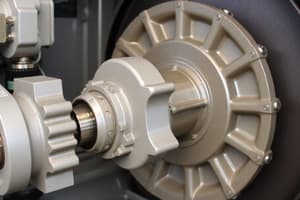Podcast
Questions and Answers
Which parameter is NOT typically monitored for engine performance optimization?
Which parameter is NOT typically monitored for engine performance optimization?
- Exhaust gas temperature
- Coolant temperature
- Fuel pump efficiency (correct)
- Turbocharger performance
What is one major benefit of Auxiliary Power Units (APUs)?
What is one major benefit of Auxiliary Power Units (APUs)?
- Increased main engine workload
- Reduced hydraulic system capability
- Decreased system redundancy
- Enhanced fuel efficiency (correct)
Which function is NOT associated with navigation and control systems?
Which function is NOT associated with navigation and control systems?
- Collision avoidance and warning
- Air conditioning and ventilation (correct)
- Vessel stabilization and control
- Route planning and optimization
What is the primary function of fuel management systems?
What is the primary function of fuel management systems?
Which type of APU is NOT mentioned in the provided content?
Which type of APU is NOT mentioned in the provided content?
Which component is essential for fuel tank management in fuel management systems?
Which component is essential for fuel tank management in fuel management systems?
What alert is part of engine performance monitoring systems?
What alert is part of engine performance monitoring systems?
Which function is related to thrust control systems in navigation and control?
Which function is related to thrust control systems in navigation and control?
Flashcards are hidden until you start studying
Study Notes
Propulsion Unit Management
Engine Performance Monitoring
- Monitors engine performance to optimize efficiency, reduce emissions, and prevent damage
- Parameters monitored:
- Engine speed (RPM)
- Fuel consumption
- Oil pressure and temperature
- Coolant temperature
- Exhaust gas temperature
- Turbocharger performance
- Data analysis and alerts for:
- Abnormal engine behavior
- Performance degradation
- Potential faults or failures
Auxiliary Power Units (APUs)
- Provide secondary power source for propulsion and hotel loads
- Types of APUs:
- Diesel generators
- Gas turbines
- Electric motors
- Functions:
- Power generation
- Air conditioning and ventilation
- Hydraulic and pneumatic systems
- Emergency power supply
- Benefits:
- Reduced main engine operating hours
- Improved fuel efficiency
- Enhanced system redundancy and reliability
Navigation and Control Systems
- Ensure safe and efficient vessel operation
- Components:
- GPS and navigation sensors
- Autopilot and steering systems
- Thrust control and propulsion systems
- Alarm and monitoring systems
- Functions:
- Route planning and optimization
- Collision avoidance and warning
- Vessel stabilization and control
- Integration with propulsion and steering systems
Fuel Management Systems
- Optimize fuel consumption and reduce emissions
- Components:
- Fuel flow meters and sensors
- Fuel consumption monitoring and analysis
- Fuel tank level and pressure monitoring
- Fuel pump and valve control
- Functions:
- Real-time fuel consumption monitoring
- Fuel efficiency optimization
- Fuel tank management and inventory control
- Alerts for fuel leaks or system faults
Propulsion Unit Management
Engine Performance Monitoring
- Engine performance monitoring involves tracking engine speed (RPM), fuel consumption, oil pressure and temperature, coolant temperature, exhaust gas temperature, and turbocharger performance to optimize efficiency, reduce emissions, and prevent damage.
- Data analysis and alerts are generated for abnormal engine behavior, performance degradation, and potential faults or failures.
Auxiliary Power Units (APUs)
- Auxiliary Power Units (APUs) provide a secondary power source for propulsion and hotel loads, reducing main engine operating hours and improving fuel efficiency.
- Types of APUs include diesel generators, gas turbines, and electric motors.
- APUs perform functions such as power generation, air conditioning and ventilation, hydraulic and pneumatic systems, and emergency power supply.
Navigation and Control Systems
- Navigation and control systems ensure safe and efficient vessel operation through the use of GPS and navigation sensors, autopilot and steering systems, thrust control and propulsion systems, and alarm and monitoring systems.
- Key functions include route planning and optimization, collision avoidance and warning, vessel stabilization and control, and integration with propulsion and steering systems.
Fuel Management Systems
- Fuel management systems optimize fuel consumption and reduce emissions through the use of fuel flow meters and sensors, fuel consumption monitoring and analysis, fuel tank level and pressure monitoring, and fuel pump and valve control.
- Real-time fuel consumption monitoring, fuel efficiency optimization, fuel tank management and inventory control, and alerts for fuel leaks or system faults are key functions of fuel management systems.
Studying That Suits You
Use AI to generate personalized quizzes and flashcards to suit your learning preferences.




